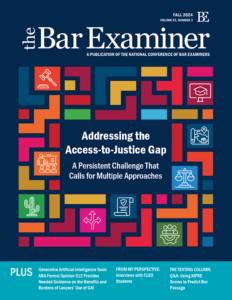This article originally appeared in The Bar Examiner print edition, Fall 2023 (Vol. 92, No. 3), pp. 45–46.
Attorney Admissions
Character and fitness; ADA; equal protection clause
A US district court dismissed an applicant’s claims against the Tennessee Board of Law Examiners for violations of the due process and equal protection clauses of the Fourteenth Amendment and of Title II of the Americans with Disabilities Act after finding the applicant’s facial challenges to fail.
Menachem Langer applied for admission to the Tennessee Bar in 2020 after earning a law degree and passing the bar examination. The jurisdiction requires all applicants undergo a character and fitness investigation. Applicants denied admission on character and fitness grounds must wait three years before reapplying to the state bar. The Tennessee Board of Law Examiners (TBLE) denied Langer admission at this stage.
Langer made two claims against the TBLE: one for violation of the due process and equal protection clauses of the Fourteenth Amendment and one for violation of Title II of the Americans with Disabilities Act (ADA). The Court “dismiss[ed] Langer’s as-applied challenges to the character-and-fitness rule and the accompanying three-year reapplication ban on the basis that the Rooker-Feldman doctrine barred its consideration of the TLBE’s decision as to Langer’s admission…. However, the Court ruled that Langer’s facial challenges could proceed.” Langer moved for a preliminary injunction, which “request[ed] that the Court: (1) preclude the TBLE from enforcing the three-year reapplication ban, thereby allowing Langer to immediately reapply for bar admission; (2) require the TBLE to adopt a statement of policy pursuant to Tenn. Sup. Ct. R. 7 § 6.01(b) to guide and implement the application of the character-and-fitness rule in conformity with Title II of the ADA; and (3) preclude the TBLE from ‘harassment and/or discrimination against Plaintiff on the basis of his disability’ in his reapplication for bar admission.” The Court denied this motion, and, further, dismissed Langer’s due process claims—in part because applicants do not have “a due-process interest in a potential law license.”
Regarding the equal protection claim, Langer “alleg[ed] that the character-and-fitness standard and three-year ban discriminate against individuals with physical disabilities.” However, the Court found such a challenge fails, as these “are not facial classifications.” There is no disclosure about an applicant’s medical history as part of the character and fitness process, or regarding institution of the three-year ban. The Court continued, saying that “even if the two rules classified based on disability status, law licensing is a compelling state interest,” referencing Goldfarb v. Va. State Bar.
Regarding Langer’s ADA claim, the TBLE made several arguments, with the Court taking up one: “[T]here are many situations in which the [character and fitness] standard does not violate the ADA, meaning a facial challenge fails.” Referencing the application of the Salerno standard for facial challenges in Witzke v. Idaho State Bar, the Court found that same applies in this case: the TBLE’s discretion, allowed by the rules that govern law licensing in Tennessee, means the character and fitness standard can be applied in a number of ways that do not involve, much less violate, the ADA. Langer’s claims were dismissed.
See Langer v. The Individual Members of the Tennessee Board of Law Examiners, Case No. 3:22-cv-449 (TN 2023)
Attorney Admissions
Character and fitness; unauthorized practice of law
New York’s Supreme Court, Appellate Division, Third Department, denied an application to practice law on character and fitness grounds, citing a lack of candor on the applicant’s part, among other factors. The applicant, who previously engaged in the unauthorized practice of law, admitted during a hearing before the Court to additional years of unauthorized practice of law beyond what he disclosed on his application.
An applicant passed the bar examination in New York in 2018 and applied to the New York Bar. As part of the character and fitness process, the applicant took part in a hearing conducted by the Committee on Character and Fitness, which recommended he be admitted to the bar subject to certain conditions. Such a recommendation then went to the Court for a final decision.
On his application for admittance to the bar, the applicant disclosed, as the Court states, the following: having “not yet taken the bar examination” or been “licensed to practice law in any jurisdiction, [the applicant] applied for and was subsequently hired as an attorney, working for two different law firms in New York during the relevant time period. For nearly a decade, therefore, he held himself out as a licensed attorney to his employers and the general public and practiced law, ultimately becoming a partner in one of the law firms.” After an employer uncovered that “he intentionally misrepresented the status of a pending matter to one of his direct supervisors,” he was asked to resign; his lack of a New York law license came to light later. The applicant “ultimately pleaded guilty to grand larceny in the second degree, a class C felony, and was sentenced to five years of probation” after an indictment for this and several other charges. The applicant claims depression and alcohol abuse played a part in these actions.
But the application doesn’t tell the whole story—the applicant did not disclose that his resignation came after “his fabrication of a court order—a deliberate attempt to deceive both his employer and his client regarding the status of a pending matter.” The applicant also engaged in additional unauthorized practice of law at another New York law firm for another four years prior to those disclosed on his application. These facts were discovered via questioning at the applicant’s hearing. The applicant also admitted he has not undergone treatment for mental health or substance abuse. Finally, “his present employer’s website nevertheless represented that he was employed as ‘Senior Counsel.’”
The Court denied his application, finding that the applicant did not possess the necessary character and fitness to practice law due to his previous actions and lack of candor during the application process.
See In the Matter of Anonymous, an Applicant for Admission to Practice as an Attorney and Counselor-at-Law, 2023 N.Y. Slip Op. 2933 (N.Y. App. Div. 2023), 188 N.Y.S.3d 803
Contact us to request a pdf file of the original article as it appeared in the print edition.








